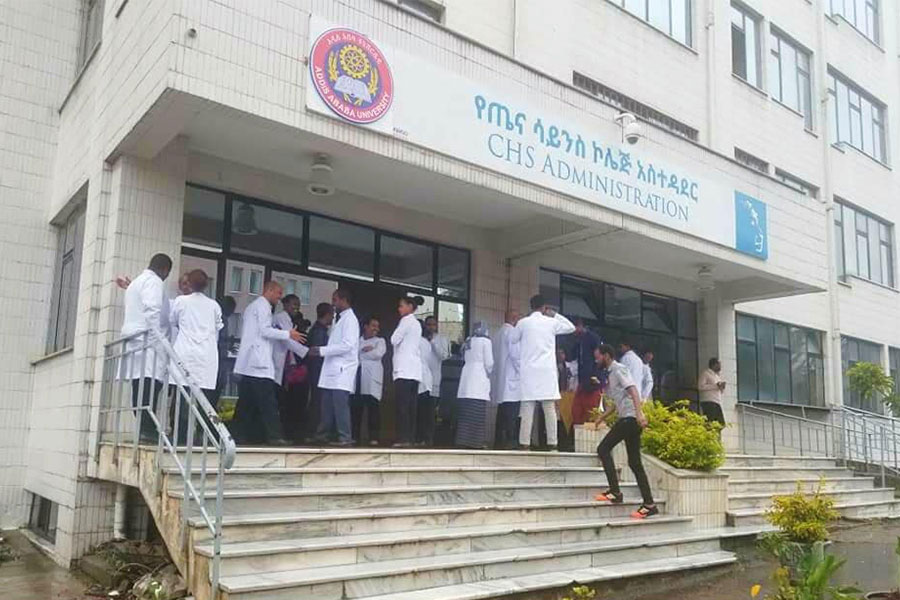
Advertorials | Jun 05,2023
The 17-year-old student sat on the chair wearing an oversized black hoodie that swallowed his stature. He was in the Principal's office with a bruised face and red eyes. His lips were trembling, and his hands were shaking. Speaking, his voice betrayed him, revealing the nervousness he felt inside. Although he was not in pain then, he started taking Tramadol, medicine doctors prescribed to treat moderately severe pain, a year ago.
The student recalled his first experience with six of his classmates, each taking two capsules of Tramadol, hoping to get relief from the afternoon classes they felt were dreadful.
"I felt euphoric and relaxed," he said.
It has been a rollercoaster ever since that day. He has been a regular user for four consecutive months. The excitement slowly turned to an urge to use the drug more frequently, which implies that it has become a compulsive use. He and his friends reached a point where they could not function without the constant dose.
Access has not been an issue for the 17-year-old, as one of his classmates was the daughter of a drugstore owner. She brings close to five strips and supplies her friends for free, reimbursing the cost and selling them to students from other classes at a higher price.
Tramadol was over-the-counter (OTC) medicine bought from local pharmacies without a physician's prescription. The availability and relatively cheaper price compared to other addictive substances made it popular among high school students. Cannabis, also known as marijuana, could be sold for 3,500 Br a kilo, while one gram of cocaine would go for up to 1,800 Br. A strip of Tramadol containing 10 capsules costs 30 Br.
The student has exacerbated epileptic seizures, a disorder in which nerve cell activity in the brain is disturbed. However, he found spending a day without Tramadol inconceivable until the drug chain had been broken. He admitted to the report and provided the details to the school administration.
For Workie Guto, 52, a clinical pharmacist, the use of over-the-counter drugs has become epidemic in recent years. She has been in the field for over a decade and noticed the demand for Tramadol growing.
"It has been an issue for the last five years," she told Fortune.
Tramadol is classified as an opioid, a psychotropic painkiller, and a highly addictive drug, such as morphine and heroin.
MedlinePlus, an online service under the Maryland-based National Library of Medicine (NLM), the world's largest medical library, classifies Tramadol with opiate (narcotic) analgesics. For it works by changing how the brain and the nervous system respond to pain, it cautions against prolonged use and warns it "may be habit forming."
Chairing the Department of Psychiatry of the School of Medicine at Addis Abeba University, Solomon Tefera (PhD) is the founder and General Manager of Renascent Mental Health & Rehabilitation Centre. According to the Psychiatrist, people addicted to Tramadol must take it regularly, increasing the dose and eventually substituting a stronger alternative to get the desired effect.
Mebratu Eyasu, assistant professor of pharmacology at St. Paul's Hospital Millennium Medical College, recommends four doses depending on the pain. Using Tramadol for longer can cause psychological and organ damage, such as liver and kidneys, even leading to death. An addicted individual can also encounter a nervous system disorder.
Tramadol contains chemicals that cause adaptation in the body and is prescribed to patients in severe pain, such as individuals that sustained car accidents. In the case of operations, patients are given the drug as a post-operative pain medication, said Tesfaye Alemu, an anesthesiologist at Bestega Mother & Children Hospital.
"They can be resistant to anaesthetics," said Tesfaye. "However, the intensity hasn't been studied yet."
Under the Ministry of Health, the Ethiopian Food & Drug Authority (EFDA) conducted a detailed study and removed Tramadol from OTC drug lists four years ago. The study concluded that Tramadol abuse had reached an alarming level, with an eight percent prevalence rate in the age group ranging from 13-19 in and around Addis Abeba. Eight students of this age group out of 100 in 218 secondary schools in the capital may have fallen in this addictive trap.
Workie said she stopped selling the drug to students immediately after the Authority removed the drug from off-the-counter sales.
A month ago, a girl with uniforms came to Workie's pharmacy and begged to get the drug without a prescription, claiming it was for her grandmother. However, the Pharmacist became suspicious seeing her pale face and restless manner.
"I said I won't give her even if her grandmother is dying," she told Fortune.
She blames doctors at healthcare centres for prescribing excessive doses. Not only teenagers but adults addicted to other narcotics also buy Tramadol. She sometimes reduces the prescribed doses if she feels uneasy.
The length of time students spend at school plays a major role in their choices and behaviours, and peers easily sway them. High schools in the capital have become conscious of the issue and have begun to take measures.
Harmony Hill School was established eight years ago, a few kilometres from Summit Square on the northeast edge of the capital. It enrolled 2,100 students, of which 480 are in high school. Since the start of the school year, 20 students have been expelled. They were caught under the influence of Tramadol inside the school premises.
Under the directorship of Mulatu Dabash, the school became aware of the growing habit of drug abuse last year. A ninth-grade student was found unconscious in a restroom. She had watery eyes and heavy eyelids from the drug overdose. The Principal described the incident as a shock to the administration and the school community. Parents were called to an emergency meeting, alerting them of the situation with a caution to keep a close eye on their children.
Mulatu noticed nearly half of the parents were unaware of the gravity of the problem. The rest had not realised that it had knocked on their backyard door.
"We weren't surprised," Mulatu told Fortune. "We didn't know either."
The school management installed security cameras at gateways, corners, and the school compound, desperately attempting to curb the impending tragedy. It has been noticing more students were under the influence. Trained personnel were assigned in every classroom to identify a student under the influence and report to the school administration.
The problem is particularly evident in pharmacies near schools, where students have easy access. There is a gap in follow-up reports from industry players. Health centres and pharmacies in the capital must submit audit reports for Tramadol to the Authority. However, there have been cracks in monitoring and enforcement work.
"We only hear rumours," said Yimer Hussein, pharmacology specialist for the Food, Medicine & Health Care Administration & Control Authority under the Addis Abeba City Administration.
The Authority regulates 23 private hospitals, 1,169 drug stores and pharmacies, and 63 speciality health centres operating in the capital. Aware of the growing drug misuse in high schools, for fear that it may exacerbate the problem, the Authority forewent disclosing the gravity of the crisis to the public.
"We're afraid that other students would become aware and start using it," Yimer told Fortune.
On the road from CMC to Summit, Yohannes Derese, a salesman at Figa Pharmacy, witnessed that more teenage buyers had come into the store.
"On average, four buyers appear daily without medical prescriptions," he said.
The rumours that more students are using the drug prompted the Authority to tighten the monitoring procedure and inspect pharmacies, checking the diagnosis even if the buyer comes with prescriptions. Its officials inspect drug stores and health institutions four times a year, ensuring that the drugs are stored in separate rooms and strictly following up on audit reports.
Experts from the Authority inspected pharmacies last year, and many were caught selling drugs containing narcotic substances without prescriptions. This put them in a dilemma to close several pharmacies simultaneously for two years.
Countries attempt to regulate drugs with a high chance of abuse or causing addiction. Tramadol abuse was also attempted to be regulated. Egypt tried to limit Tramadol dosage in 2002 because of its growing use. Narcotic drugs are transported by airfreight instead of shipment to prevent illegal distribution.
EFDA sent out a letter two months ago, reinforcing the earlier circular about the strict supervision of Tramadol in the distribution system, which was unsuccessful. The Authority oversee shipments, distributions, and retail sales through its six branch offices across the country.
"We're serious about tightening the regulation this time," said Teshta Shote, product safety director at the EFDA.
Tightening the distribution chain alone would not solve the problem, according to Zelalem Assefa, technical manager at Kare Pharmaceutical Plc, one of the 24 importers that have obtained permits to bring in drugs with narcotic substances.
Pharmaceutical importers must obtain a special permit to import narcotic drugs such as Tramadol by airfreight with strict follow-up procedures during distribution. Importers must send a copy of the license to international pharmaceutical suppliers.
"The root of the problem needs to be monitored," said Zelalem.
Incorporated in 2009, Kare imported Tramadol as a capsule and injection forms worth up to 50,000 dollars from India, the largest supplier. The company has stopped importing the capsules for nearly two years, owing to the sensitive nature of the Tramadol drug and foreign currency shortages.
Ethiopia is a member of the International Narcotics Commission Board (INCB), established in 1968 as the independent monitoring body for implementing the UN international drug control conventions. The board inspects, monitors, and gives permission to member countries if they import narcotic drugs beyond the acceptable amount.
Established in 1947, the state-owned Ethiopian Pharmaceutical Supply Agency (EPSA), the largest pharmaceutical buyer in the country, imports drugs and medical equipment and distribute it to health institutions and hospitals across the country through its 19 branches. Last year, it imported 17 billion Br worth of medical equipment and drugs to supply more than 5,000 health institutions. Its import bill accounts for 90pc of the imported drugs in the country.
Tramadol is one of over 1,000 drugs imported by the Agency. Its branches distribute the drug based on the patients' number and the demand from the health institutions. Experts at the EFDA are trying to create awareness among high school students and teachers about the issue and how it would affect their health.
A high dose of Tramadol can result in several side effects, including hallucinations, confusion, and increased suicidal tendencies. It may cause uncontrollable shaking of body parts, nervousness and loss of consciousness. Some users may resort to intravenous Tramadol, exposing them to different infections, skin ulceration, and even death from overdose due to its adverse effect on the heart and respiratory system.
"The addiction can be very severe," said Solomon.
For an addict to return to a normal lifestyle requires detoxification, freeing bloodstreams of toxins, and rehabilitation procedures. The treatment has to be given for at least three months.
After a couple of weeks of suspension from the school and help from his family to get cleansed, the 10th Grader was back in school as a "recovering addict." His classmates were dismissed. But he was recovering after stopping a daily dose of three. His school administrators are alert, battling a scourage creeping under the surface, eating the vitality of a young generation.
PUBLISHED ON
Nov 19,2022 [ VOL
23 , NO
1177]

Advertorials | Jun 05,2023

In-Picture | May 18,2024

My Opinion | Aug 13,2022

Sunday with Eden | Oct 21,2023

Fortune News | Aug 12,2023

Fortune News | Jun 29,2025

Verbatim | May 24,2025

Commentaries | Oct 22,2022

Fortune News | Sep 29,2024

Fortune News | Mar 30,2024

Dec 22 , 2024 . By TIZITA SHEWAFERAW
Charged with transforming colossal state-owned enterprises into modern and competitiv...

Aug 18 , 2024 . By AKSAH ITALO
Although predictable Yonas Zerihun's job in the ride-hailing service is not immune to...

Jul 28 , 2024 . By TIZITA SHEWAFERAW
Unhabitual, perhaps too many, Samuel Gebreyohannes, 38, used to occasionally enjoy a couple of beers at breakfast. However, he recently swit...

Jul 13 , 2024 . By AKSAH ITALO
Investors who rely on tractors, trucks, and field vehicles for commuting, transporting commodities, and f...

Jul 12 , 2025
Political leaders and their policy advisors often promise great leaps forward, yet th...

Jul 5 , 2025
Six years ago, Ethiopia was the darling of international liberal commentators. A year...

Jun 28 , 2025
Meseret Damtie, the assertive auditor general, has never been shy about naming names...

Jun 21 , 2025
A well-worn adage says, “Budget is not destiny, but it is direction.” Examining t...